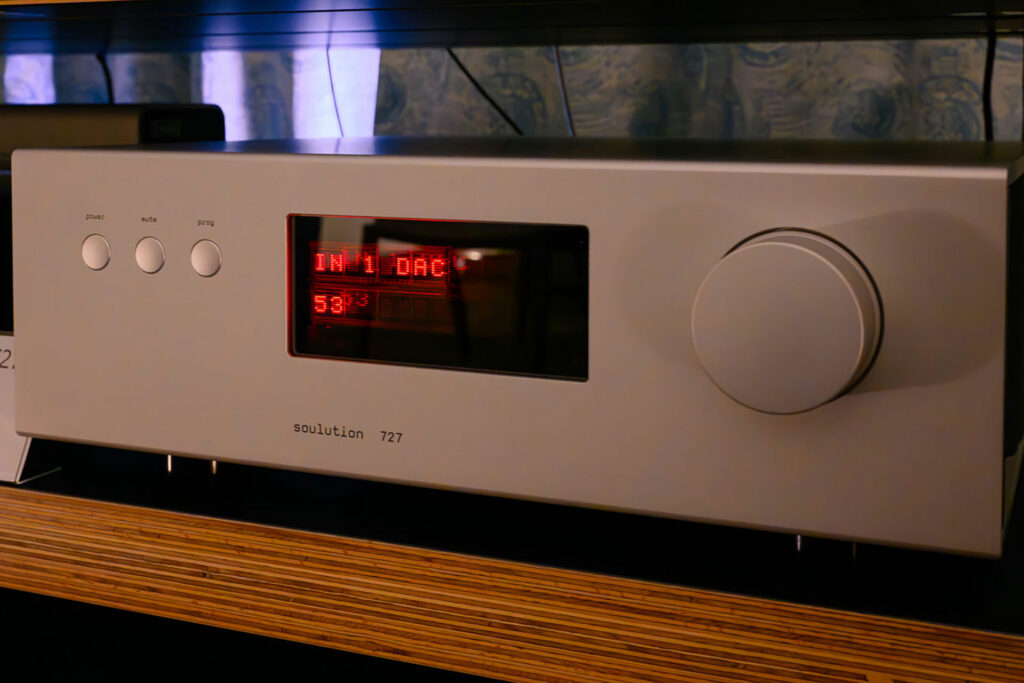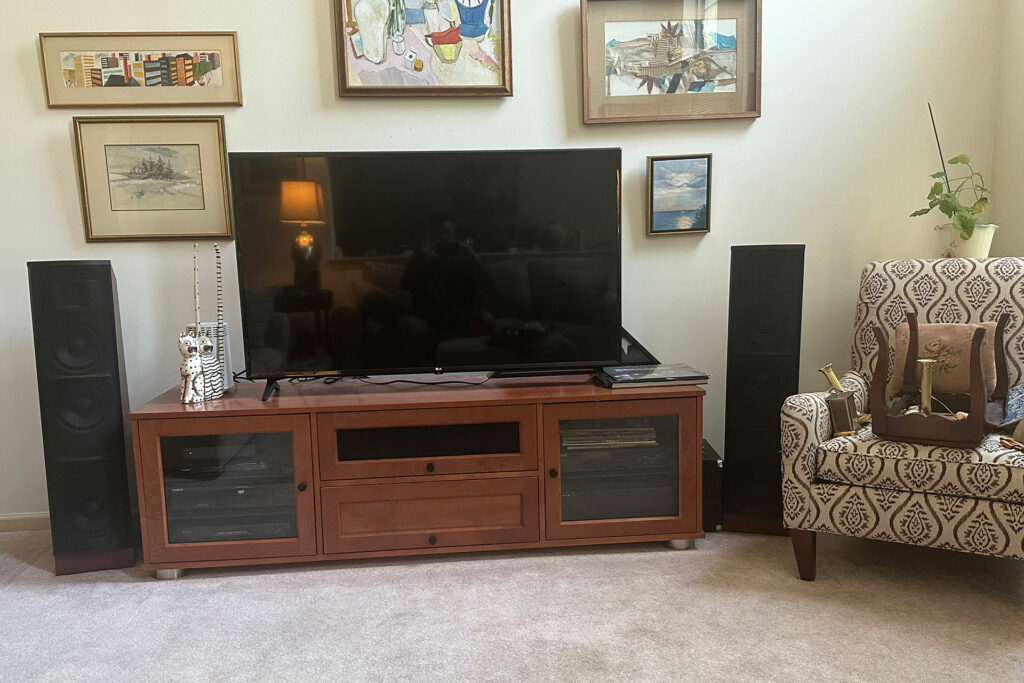At its lowest common denominator, involving oneself in the practice of the audio arts, what we practitioners known as the audiophile hobby, is quite simple to understand. Audiophiles want, demand, and are always in search of an immersive, dynamic and magical musical experience. A respectable (and not always super-expensive) audio system is as much a time machine as it is a delivery method for sonic goosebumps. We invest what most people would think is a very large sum of money, and even more time and passion, in chasing the exhilaration of experiencing music in its most realistic, studio-like or live form. In real terms, our hobby is defined by its name – “audio” being obvious and “phile” meaning “lover of.” We are all lovers of, well, all things audio. That’s what drives us through our audio journey.
We audiophiles can discuss and commiserate with each other about audio subjects ‘til the cows come home, as the saying goes, and not think anything at all is unusual. Listen in on the discussions in the hallways at any reputable audio show, and you will hear total strangers trading tips, opinions and advice on improving performance and relative cost and value in terms of available audio gear. Where things get much more difficult is trying to explain to someone, anyone, who is NOT an audiophile exactly what all the fuss is about in our hobby. Most people have an emotional response to music. Younger listeners who have grown up with unlimited streaming might love music even more than the older, original audiophiles. Music is a big part of movies, television, gaming and more. The music played at most restaurants or retail establishments is often carefully curated. This music works to create a positive interaction (meaning spending), because everybody generally reacts in some way to music – often positively. So given these conditions, why aren’t more people investing in high-performance audio systems? Why aren’t they audiophiles? This is where things get complicated.

What Non-Audiophiles Do Not Understand About Our Hobby
- Because our chosen hobby is, in part, a study of science and acoustics, many non-audiophiles (abbreviated NA for future reference) hardly see the point. While we may research and discuss amongst our own kind why speaker placement matters, or why standing waves are so destructively harmful, or any number of audio technicalities, our NA brethren could basically not care less. They are perfectly content to listen to a song on a handheld device or some contraption where one calls out a name and commands it to “play rock and roll!” In and of itself, this is perfectly acceptable – to each their own. Yet why we steadfastly think and operate so differently is an enduring mystery.
- I suspect many audiophiles will disagree with other family members regarding the placement and positioning of a home audio system. Most NAs position a stereo largely for aesthetics, not sonics. Many NAs feel components are ideally housed in a cabinet behind closed doors. Speakers are best when they are small, and may be neatly hidden behind a plant on a bookshelf or wall unit. Trying to explain soundstage and imaging as a reason why five-foot-tall speakers must be six feet into the room is an argument almost destined to fail.
- Wanting to incorporate an audio system and, for that matter, even a two-channel/home theater system in the den or great room is very often exceptionally difficult to justify. Out of context, the idea of investing tens (if not hundreds) of thousands of dollars on audio and/or AV equipment can go over poorly. The concept of making the den or great room into a family entertainment center might help mitigate the shock of the cost of the endeavor, but often challenges and objections may still arise from significant others. Doesn’t a soundbar make sound for the TV as does more sophisticated audio equipment? Yes, it does, but it isn’t the same thing, which, sadly, is a largely misunderstood point.
- If, however, like myself, you have space for a dedicated listening room, trying to convince the NAs in the home of making the room suit a dedicated two-channel audio system might be pervasively difficult. If, physically or aesthetically, the den or great room is not available for a two-channel system, maybe a seldom or unused bedroom, or even a bonus room could instead be used. Now you find yourself forced to explain things like audio racks, five-foot-tall speakers and one-inch-thick cables running along the floor. Oh, and let’s not forget the acoustical wall treatments, because audio rooms universally need to be treated for sonic nasties. Significant others really love those things. Wanting to make such spaces in the home dedicated to only one purpose is often wildly misconstrued. I’ve had quite a few guests in my audio room ask me in a confused tone why I do not have a big 85-inch television on the wall. When I answer that I’m trying to mitigate reflections, it becomes immediately obvious no one understands what the heck I’m talking about. Making a convincing argument about the many benefits of a dedicated two-channel audio room becomes suddenly difficult.
- Cost certainly ranks up there as one of the most misunderstood parts of audio to explain to almost any NA. It goes without saying there are varying degrees of wealth and income. Some of us have far less, others far greater ability to afford luxury items – including high-performance audio systems. However, all of us have some limit on what we can spend for an audio system – whether fiscally mandated or self-imposed. Cost utilization is also at work here. Is a $50,000 stereo system really the best allocation of such a sizable amount of funds? Could the money not be spent elsewhere? Maybe the house needs a new deck, or the kitchen is in serious need of being updated. Which will the family as a whole use most often, the kitchen or a stereo system? Even if cost is not an issue, is the price worth it, as opposed to some other way to spend the money?
- Going to an audio show may, for many NAs, be a source of amusement. Let’s face it, there are trade shows and conventions for almost everything. Why should high-performance audio be any different? Tell the family, however, you are going to take one or two days off of work, purchase an expensive plane ticket and hotel room, in addition to other travel expenses, all in an effort to look at stereo systems, and their reaction may be one of bewilderment, if not downright disdain. Even when a NA partner is invited to attend a show, how interested will they realistically be in doing so? However, for an audiophile, these shows are generally three days of absolute fun.
- Many NAs cannot fathom why we buy multiple versions of the same artist’s work. Pick an artist’s release and I’ll bet dollars to dimes there are multiple versions available in multiple formats. I have five different recordings of Jethro Tull’s Thick As A Brick in both digital and LP. Why do I need five copies of this artist’s work? Simple, because I can have them. Audiophiles understand this perfectly, while NAs most likely do not.
- Perhaps a source of bafflement as great as any other is that we are never satisfied and always want to improve our audio systems. Oh, boy, am I guilty of this. Every audiophile friend I know teases me because I am constantly proclaiming my system is done. Finished. I don’t need to make any more changes. And in almost the next breath, I’m describing the new whatever I find interesting. If my audiophile friends and contemporaries find humor in this, imagine the reaction from non-hobbyists?

What Can Audiophiles Do to Better Explain and Justify the Hobby?
- Invite NA family members to a low-pressure, super-fun and relevant listening session. Most audiophiles will agree our hobby is preeminently better when it can be enjoyed by a group rather than individually. Many audiophiles, however, listen alone, which further distances the hobby from other family members.
- Invite neighbors, especially if they have teenaged children, over for dinner, followed by a listening session. This could even be expanded to co-workers. Becoming an ambassador for the hobby is never a bad thing. And while it is true that doing so may not make anyone want to run out and buy a high-end system, it does show NAs what is possible. Helping to explain our madness is something we should always strive to accomplish.
- Explain to NAs what they might be hearing and why they are hearing it is part of your role as the leader/host of the listening session. I’ve had many NA guests ask me why there is music far to the right and/or left. The concept of imaging is in no way understood. Maybe a very simple explanation might help. Or, perhaps better still, move one speaker a few inches and play the same song again. Then return the speaker to the original position. Almost any NA will hear for themselves why speaker placement matters. Of course, one point may also be made when doing so – if the version with remarkable imaging sounds far better than the incorrect location, is it now easily understood why speaker position matters? Does listening to something with improved sonics now make more sense?
- Help NAs become better, more informed listeners. I suspect nearly all audiophiles know that listening is a learned experience. We train ourselves to become better listeners. This explains why we have certain songs we know very well. We use these songs as a means to judge sonic consistency. We listen for small sounds that come and go very quickly, better known as transients. Maybe we stop a song and ask our NA listeners if they even recognized the transient they just heard. Maybe it was a triangle, or a chime, maybe a set of castanets, any percussive instrument briefly heard, then gone. Pointing out these details may help explain our devotion to something the uninformed basically feel is less than worthwhile.
- Play dynamically powerful music when an NA is in the audio room. Maybe a full-tilt symphonic piece. Or perhaps a high-decibel rock and roll song. Something with high-octane musical energy. Point out to the NA how headroom works, and how listening to the same song on a cell phone will never yield the same experience. I’ve never had one guest in my audio room who was unfamiliar with high-performance audio not have an “oh wow” feeling after a dynamically powerful song was played. Not one. Ever …
- Point out concepts such as clarity and accuracy. Explain the sonic difference between a kick drum and a bass guitar, and how they may be separately heard. Do instruments like an alto sax sound like they have a razor-sharp edge when a high note is played? Do singers sound like they are in the room singing live? It is important for NAs to understand what draws us to the hobby. Maybe they won’t be converted, but if they have better insight, it makes understanding our passion more likely.
- Ask NAs what some of their favorite songs are, and then play them, even if they are pristine audiophile recordings, as you will get your fair share of those tracks in to during your listening session. Most of us have streaming and can easily access almost any music imaginable. I’m not a big fan of streamed music, because I feel it inferior to a physical CD copied to my server, but I cannot deny that I have really impressed any number of NAs because I played something with which they are familiar. I’ve been told more than once how amazing their favorite song sounded and how they never realized what they had been missing.
- Make the NAs in the home part of future audio decisions. It will probably be difficult to engage NA family members in too much technicality, but asking an opinion based on a series of easily understandable facts may yield a positive and constructive discussion. Making everyone part of the decision of whether or not to upgrade a component may be the best path for doing so.

Final Thoughts on Explaining the Audiophile Hobby to Non-Audiophiles …
Face it, we audiophiles live on our own sonic island. Our little island is one dedicated to a hobby we view as much as a lifestyle as something to do with unused free time. We read books to better educate ourselves on the hobby and the science behind how it works. We read equipment reviews, talk to friends, and demo a range of available components, all in an effort to make a wise choice on what gear best fits our needs. When we are around a group of like-minded enthusiasts, we discuss the generalities of the hobby. What we do not discuss is the validity, or even the necessity, of having such a system, regardless of cost. Because we all agree on one thing: high-performance audio is a chosen, preferred passion, and one in which we willingly choose to participate.
Aside from a universal agreement that the cost of audio gear is too high, what we spend on a system is of little consequence. I have written some sizable checks in my audio lifetime and, once the new whatever arrived, what I spent procuring my new prize was perceptibly and quickly forgotten. Cost is relative. And whether or not we spend a little or a lot, because manifestly this is not about an actual dollar amount, it’s for enjoyment’s sake. Once we justify the expense and subsequently write the check, the cost is pretty quickly forgotten. Ours is a hobby best born from disposable income. We want to put our systems in the home in such a way that they may be enjoyed to the fullest. And if other family members participate, wonderful! The more the merrier!
I have told the wives of any number of audiophile friends that an audio system is a much safer hobby than, for instance, a sports car. For one, with an audio system, she will know where her significant other is. And secondly, there is far less chance of injury, because the temptation of the gas pedal does not exist in an audio system. As the owner of an exceptionally fast Italian sports car, I can attest to this first-hand. However, at the end of the day, the opinion of most NAs as it applies to an audio system and where in the home it will reside is, and will be, contradictory at best.
Too bad the non-audiophile world cannot see our systems and understand our passion in the same positive auditory light. Too bad our audio journey is one we will always have a difficult time explaining. We put up with, and endure, the confusion as to why we are so devoted to a hobby so far from mainstream. Why we are amenable to spending vast sums of money on a system (regardless of the actual amount), why we are hyper-focused on the technical aspects of gear and acoustics, why we go to such extreme lengths to position speakers in the room, and why we listen to music both analytically and for personal enjoyment may always be misunderstood by the uninformed. Perhaps one day this will change. Maybe one day we will not need to explain ourselves. Hopefully, one day, our chosen hobby will become more mainstream. Someday soon. One can hope …
Tell us about how you’ve done outreach to NAs in your world? What would you add to this strategy to make the hobby seem more relevant and less kooky? We will approve your comments quickly.




…Non-audiophiles is a must-read for all music lovers. Paul nails it!
Why, many thanks Wayne!!!
Paul